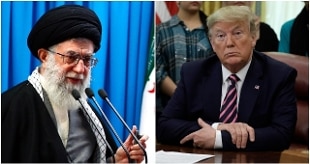- Iran, Khamenei: US affected in pride, attack wanted by Allah
Share
by Zouhir Louassini 17 January 2020In international politics there is no room for naivety.The usual anti-American rhetoric that impregnated the speech of the Iranian Supreme Guide, Ayatollah Ali Khamenei, in Friday prayers in Tehran, cannot hide the difficulties of the Iranian regime after the American decision to kill General Qassem Suleimani, one of the men most powerful in the Middle East.
Khamenei speaks of "the Iranian power to slap an arrogant" like the United States by presenting the Iranian response as the "demonstration that God supports us". It is obvious: it does it for internal consumption. Because the facts attest to a totally different reality: 50 dead among the Iranian demonstrators, crushed during the funeral of Suleimani; to which must be added the 176 dead of the Ukrainian Boeing, shot down by the guardians of the revolution.
The Iranian response, more symbolic than anything else, caused 11 American soldiers to be injured and some material damage to US bases in Iraq.
The "calculated" tension between a world power and a regional one could not end otherwise. Any other conclusion responds only to deployment logic, as fans; or to ideological visions for which the answers anticipate the questions. International laws have always respected the reasons of the fittest. All we've seen in the past few weeks has only been confirmation of this rule.
The words of the Supreme Guide are thus read as part of a continuous "dialogue" between two opponents who keep an eye on each other. Their reaction is always within the limits of a well-written script, because none of the actors want to improvise. Killing General Suleimani in Iraq - not Iran - was the first joke. Iran's attack on two American bases - still in Iraq - was the measured response by a regime that cannot and does not want to lose face in front of its people.
By killing the Iranian strategist, President Trump has decided to strike hard to mark the limits between what that dialogue may or may not include: no to the killing of an American interpreter in a missile attack on the Iraqi-American base in Kirkuk; and, above all, no to the siege of the American embassy in Baghdad. Actions both carried out by Iraqi Shiite militias very close to Iran.
When Professor Robert Jervis, one of the most observant observers of conflict between states, writes in War on the Rocks that after what has happened in the past two weeks "neither President Trump nor the Iranians know what to do now", describes a situation of uncertainty that does not respond to the facts. In the Middle East, until proven otherwise, the Americans have the initiative. Iranians have "the honor of resisting".
The well-known thesis according to which "enemies of the West" are "strong and dangerous" is a deja-vu that recent history has denied. Let us remember the end of the former Iraqi dictator Saddam Hussein and that of the Libyan Gaddafi. Presented as great adventurers who endangered world peace, it was finally understood that they were just paper tigers.
Leadership in Iran is aware of this fact and behaves accordingly. It takes time to arm well. The Iranian army is ready for small regional battles but it is not ready for a real war against the United States. Trump knows this very well: he strikes at the right time and in the right place, making it clear to everyone who is in charge in the region.
After all, just take a look at the map to realize that Iran is surrounded by the American presence: 54 thousand soldiers in a dozen Middle Eastern countries, with military bases in seven of them.
It is no coincidence that the first sentence spoken by the Iranian spiritual guide after the killing of Suleimani was the usual refrain: "the American presence in the region must end". However, nothing seems to indicate that the United States wants to abandon an area, such as the Middle East, of such great strategic importance.
Khamenei called Trump a "clown" in his sermon; but it would not be wrong - without this to sound like a moral judgment - to consider the president's decision to eliminate General Soleimani, as the revelation of a strategic ambivalence that will mark a "before and after" in the conflicts afflicting the Middle East.
In the absence of warnings, the Iranians had increased their advantage in recent months by hitting Saudi oil installations, taking ships hostage in the Strait of Hormuz and destroying American drones. Trump's response has only reestablished power relations, to give a boost to a "dialogue" that has only started.

